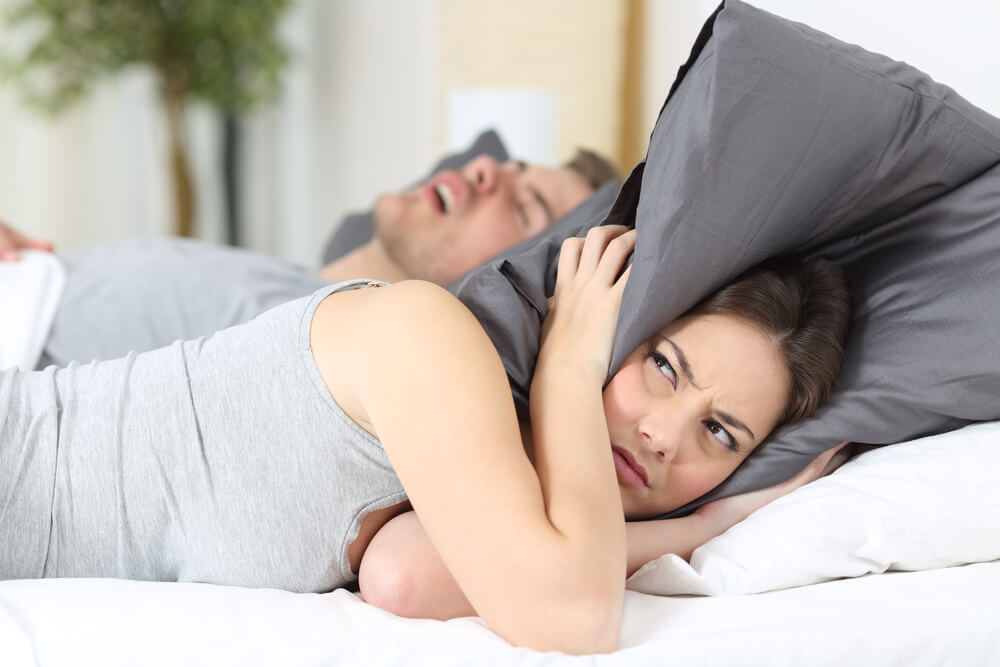Sleep Apnea and Snoring
in Silver Spring, MD
Find Restful Sleep at Silver Spring Sleep Solutions
Waking up every morning feeling tired and groggy can negatively impact your daily life. Your job, relationships, and overall wellness are all affected by the quality of your sleep. Recurring exhaustion could indicate a deeper sleep issue, such as sleep apnea or persistent snoring. Thankfully, Silver Springs sleep dentist Dr. Bassford of Silver Spring Sleep Solutions is trained in treating sleep apnea and snoring to give you the rest you need to tackle your day.
Read more about Dr. Bassford’s personalized approach in our article below, so you can begin treatment and finally start waking up refreshed.
The Connection Between Snoring & Sleep Apnea
Sleep apnea is a sleep disorder that causes patients to stop breathing as they sleep due to a blockage in the throat. This pause in breathing disrupts your sleep, causing you to wake up and miss the deeper stages of sleep. Sleep specialists categorize sleep apnea by how many times a patient wakes up from pauses in breathing.
Snoring is a sound caused by vibrations in the throat. It occurs when there’s a constriction in the patient’s airway. Snoring is also a significant symptom of sleep apnea, with about half of all snorers suffering from the condition.

Diagnosing Sleep Apnea and Snoring
Whether or not your snoring is a symptom of sleep apnea, you’ll benefit from a sleep study to get to the bottom of your problem. A sleep study, also known as a polysomnogram, is a diagnostic test that assesses sleep patterns and any disturbances during sleep.
During the study, the patient stays overnight in a sleep lab. Your specialist performing the exam will use monitoring equipment that measures brain activity, eye and leg movements, heart rate, breathing patterns, and oxygen levels. The sleep specialist will then review the data to diagnose any sleep disorders, such as sleep apnea or insomnia, and determine the best course of treatment. The study is non-invasive and painless, and the goal is to create a comfortable and conducive sleep environment for accurate results.
Treatment For Sleep Apnea and Snoring
Once a sleep specialist and Dr. Bassford have examined the data from your sleep study, you’ll visit Silver Spring Sleep Solutions to develop a treatment plan. Together, you and Dr. Bassford will discuss your goals and symptoms to find the best treatment for boosting and maintaining your mental and physical health.
Continuous Positive Airway Pressure (CPAP)
A commonly prescribed treatment for sleep apnea and snoring is a continuous positive airway pressure (CPAP) machine. CPAP appliances pump airflow through a hose into a fitted mask worn over your mouth and nose. The airflow creates positive pressure that keeps your airway clear, allowing you to breathe unobstructed all night.

Oral Appliance Therapy
Although CPAP is a popular treatment option for sleep apnea and snoring, many patients find it hard to stick with their treatment. The bulky mask and hose often uncomfortably restrict a patient’s movement throughout the night. That’s why Dr. Bassford offers oral appliance therapy, a CPAP alternative that gives patients more freedom during treatment for sleep apnea.
Oral appliance therapy uses a custom mouthguard that holds your airway open throughout the night. Dr. Bassford in Silver Spring prescribes these devices for patients who find CPAP inconvenient while they travel or uncomfortable while they sleep. Oral appliance therapy works for many patients who need a more subtle solution to their sleep apnea and snoring.
Frequently Asked Questions
Can you have sleep apnea without snoring?
Yes, you can have sleep apnea without snoring. While snoring is a common symptom of sleep apnea, it doesn’t always indicate sleep apnea. Likewise, sleep apnea isn’t always accompanied by snoring. Patients worried that their snoring might indicate the presence of sleep apnea should undergo a sleep study and visit a sleep dentist to determine the severity of their symptoms.
How can I tell if snoring is a symptom of sleep apnea?
The best way to find out whether your snoring is a minor annoyance or something more serious is to attend a sleep study. A sleep study uses technology to monitor your vital signs as you sleep. These studies can be conducted at home or in a specialist’s office and are ideal for learning about your sleep habits and health.
When is snoring a sign of sleep apnea?
Sleep apnea is a sleep disorder characterized by pauses in breathing during sleep. These pauses, or apneic events, can last from a few seconds to several minutes and occur multiple times throughout the night. If snoring causes frequent pauses in breathing and excessive daytime sleepiness, it might indicate the presence of sleep apnea.
What causes snoring?
Snoring is caused by a partial blockage of the airway during sleep, making the tissues in the throat vibrate. This blockage can be caused by several factors, including:
- Obesity: Excess fat in the neck can put pressure on the airway and cause it to become narrow.
- Alcohol and Sedatives: Alcohol and sedatives can relax the muscles in the throat and contribute to snoring.
- Sleeping Position: Sleeping on your back can cause the tongue and soft palate to collapse to the back of the throat, partially blocking the airway.
- Nasal Congestion: A stuffy nose can cause you to breathe through your mouth, which can contribute to snoring.
- Structural Abnormalities: Enlarged tonsils or adenoids, a deviated septum, or other structural abnormalities can narrow the airway and cause snoring.
- Aging: As you age, the muscles in the throat can become less toned, contributing to snoring.
PHONE
OFFICE
10301 Georgia Ave, Suite 207
Silver Spring, MD 20902
